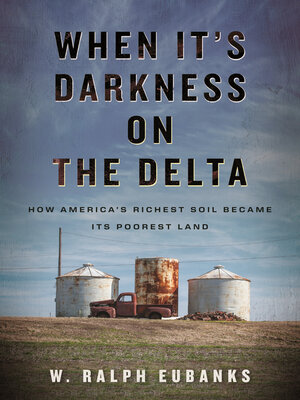When It's Darkness on the Delta
ebook ∣ How America's Richest Soil Became Its Poorest Land
By W. Ralph Eubanks

Sign up to save your library
With an OverDrive account, you can save your favorite libraries for at-a-glance information about availability. Find out more about OverDrive accounts.
Find this title in Libby, the library reading app by OverDrive.



Search for a digital library with this title
Title found at these libraries:
| Library Name | Distance |
|---|---|
| Loading... |
For readers of The Sum of Us and South to America, an essential new look at the roots of American inequality—and the seeds of its transformation
Once the powerhouse of a fledgling country’s economy, the Mississippi Delta has been consigned to a narrative of destitution. It is often faulted for the sins of the South, portrayed as a regional backwater that willfully cleaved itself from the modern world. But buried beneath the weight of good ol’ boy politics and white-washed histories lies the Delta’s true story.
Mississippi native and award-winning writer W. Ralph Eubanks digs through this loamy topsoil, revealing a microcosm of economic oppression in the US. He traverses the Delta, examining its bellwether efforts to combat income inequality, and introduces people like
Theodore G. Bilbo and William Whittington, segregationist congressmen who sabotaged federal reparations for former sharecroppers in the 1940s and ’50s Gloria Carter Dickerson, founder of the Emmett Till Academy, whose parents were instrumental in desegregating schools in Drew, MS, where Till was murdered Calvin Head, a community organizer who runs a farming co-op in Mileston, who revived the legacy of his hometown, the only Black resettlement community in Mississippi
Eubanks delivers a powerful and insightful examination of how racism and economic instability have shaped life in the Mississippi Delta. He traces the enduring consequences of political decisions that have entrenched inequality across generations. At the same time, he brings attention to the resilience of local communities and the grassroots movements working toward meaningful change. The book offers a thoughtful framework for policy reform and community investment, underscoring the need to support those who have long sustained the region through their labor and lived experience.
Once the powerhouse of a fledgling country’s economy, the Mississippi Delta has been consigned to a narrative of destitution. It is often faulted for the sins of the South, portrayed as a regional backwater that willfully cleaved itself from the modern world. But buried beneath the weight of good ol’ boy politics and white-washed histories lies the Delta’s true story.
Mississippi native and award-winning writer W. Ralph Eubanks digs through this loamy topsoil, revealing a microcosm of economic oppression in the US. He traverses the Delta, examining its bellwether efforts to combat income inequality, and introduces people like
Eubanks delivers a powerful and insightful examination of how racism and economic instability have shaped life in the Mississippi Delta. He traces the enduring consequences of political decisions that have entrenched inequality across generations. At the same time, he brings attention to the resilience of local communities and the grassroots movements working toward meaningful change. The book offers a thoughtful framework for policy reform and community investment, underscoring the need to support those who have long sustained the region through their labor and lived experience.







